The AMD Ryzen Threadripper 3960X and 3970X Review: 24 and 32 Cores on 7nm
by Dr. Ian Cutress, Andrei Frumusanu & Gavin Bonshor on November 25, 2019 9:05 AM ESTCPU Performance: Web and Legacy Tests
While more the focus of low-end and small form factor systems, web-based benchmarks are notoriously difficult to standardize. Modern web browsers are frequently updated, with no recourse to disable those updates, and as such there is difficulty in keeping a common platform. The fast paced nature of browser development means that version numbers (and performance) can change from week to week. Despite this, web tests are often a good measure of user experience: a lot of what most office work is today revolves around web applications, particularly email and office apps, but also interfaces and development environments. Our web tests include some of the industry standard tests, as well as a few popular but older tests.
We have also included our legacy benchmarks in this section, representing a stack of older code for popular benchmarks.
All of our benchmark results can also be found in our benchmark engine, Bench.
Speedometer 2: JavaScript Frameworks
Our newest web test is Speedometer 2, which is a accrued test over a series of javascript frameworks to do three simple things: built a list, enable each item in the list, and remove the list. All the frameworks implement the same visual cues, but obviously apply them from different coding angles.
Our test goes through the list of frameworks, and produces a final score indicative of ‘rpm’, one of the benchmarks internal metrics. We report this final score.
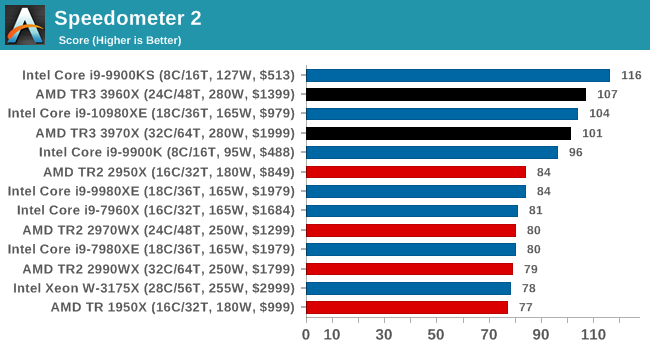
Google Octane 2.0: Core Web Compute
A popular web test for several years, but now no longer being updated, is Octane, developed by Google. Version 2.0 of the test performs the best part of two-dozen compute related tasks, such as regular expressions, cryptography, ray tracing, emulation, and Navier-Stokes physics calculations.
The test gives each sub-test a score and produces a geometric mean of the set as a final result. We run the full benchmark four times, and average the final results.
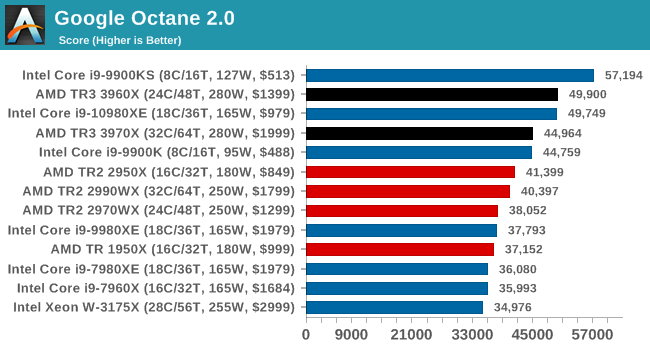
Mozilla Kraken 1.1: Core Web Compute
Even older than Octane is Kraken, this time developed by Mozilla. This is an older test that does similar computational mechanics, such as audio processing or image filtering. Kraken seems to produce a highly variable result depending on the browser version, as it is a test that is keenly optimized for.
The main benchmark runs through each of the sub-tests ten times and produces an average time to completion for each loop, given in milliseconds. We run the full benchmark four times and take an average of the time taken.
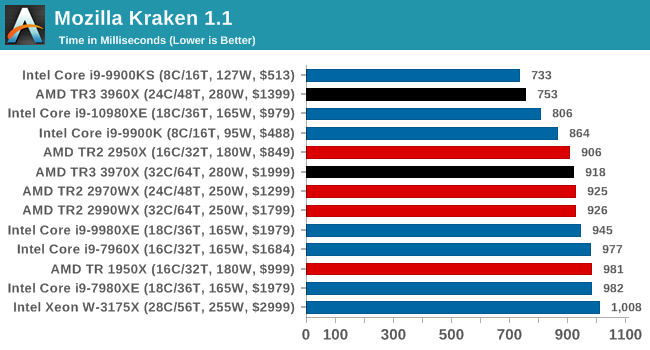
3DPM v1: Naïve Code Variant of 3DPM v2.1
The first legacy test in the suite is the first version of our 3DPM benchmark. This is the ultimate naïve version of the code, as if it was written by scientist with no knowledge of how computer hardware, compilers, or optimization works (which in fact, it was at the start). This represents a large body of scientific simulation out in the wild, where getting the answer is more important than it being fast (getting a result in 4 days is acceptable if it’s correct, rather than sending someone away for a year to learn to code and getting the result in 5 minutes).
In this version, the only real optimization was in the compiler flags (-O2, -fp:fast), compiling it in release mode, and enabling OpenMP in the main compute loops. The loops were not configured for function size, and one of the key slowdowns is false sharing in the cache. It also has long dependency chains based on the random number generation, which leads to relatively poor performance on specific compute microarchitectures.
3DPM v1 can be downloaded with our 3DPM v2 code here: 3DPMv2.1.rar (13.0 MB)
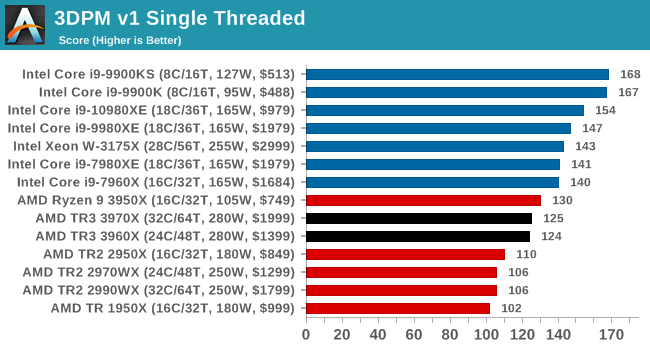
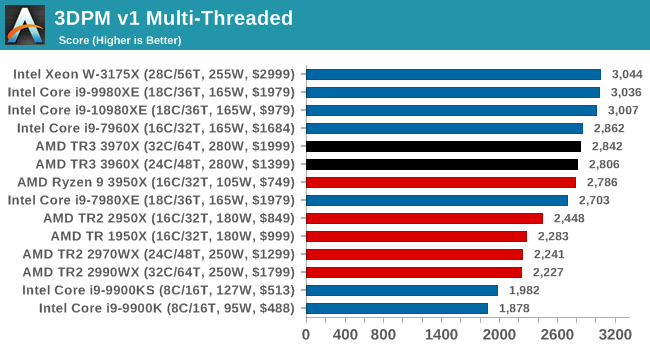
x264 HD 3.0: Older Transcode Test
This transcoding test is super old, and was used by Anand back in the day of Pentium 4 and Athlon II processors. Here a standardized 720p video is transcoded with a two-pass conversion, with the benchmark showing the frames-per-second of each pass. This benchmark is single-threaded, and between some micro-architectures we seem to actually hit an instructions-per-clock wall.
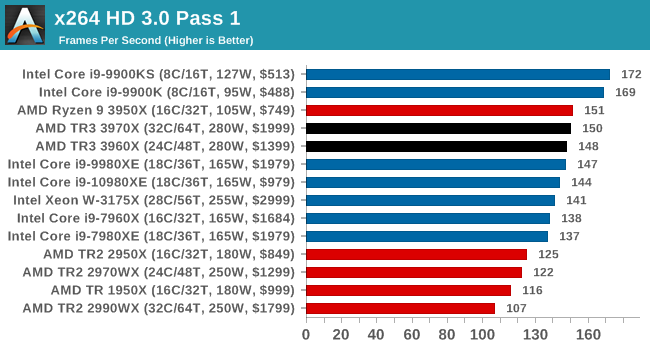
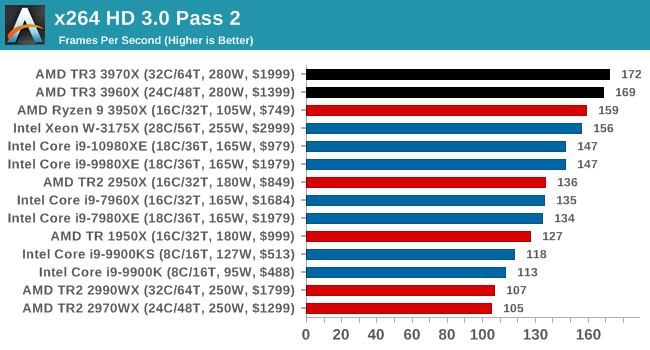
GeekBench4: Synthetics
A common tool for cross-platform testing between mobile, PC, and Mac, GeekBench 4 is an ultimate exercise in synthetic testing across a range of algorithms looking for peak throughput. Tests include encryption, compression, fast Fourier transform, memory operations, n-body physics, matrix operations, histogram manipulation, and HTML parsing.
I’m including this test due to popular demand, although the results do come across as overly synthetic, and a lot of users often put a lot of weight behind the test due to the fact that it is compiled across different platforms (although with different compilers).
We record the main subtest scores (Crypto, Integer, Floating Point, Memory) in our benchmark database, but for the review we post the overall single and multi-threaded results.
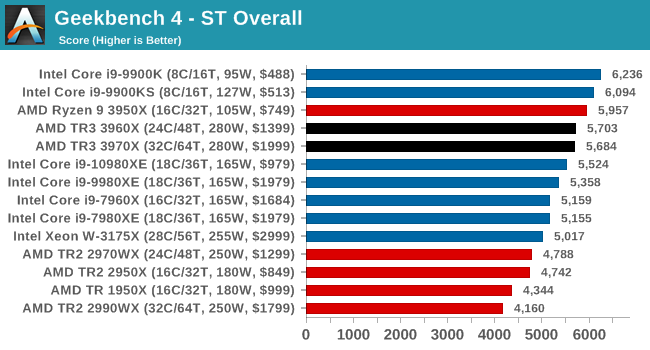
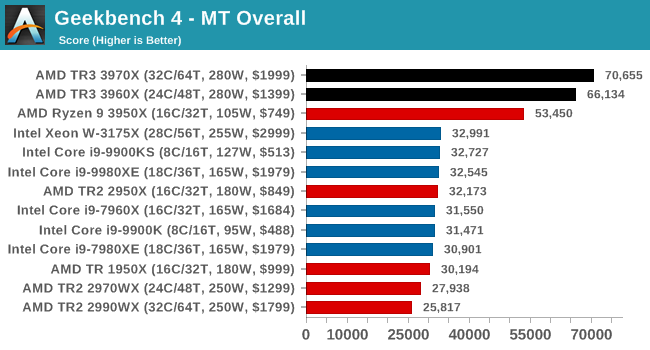










245 Comments
View All Comments
mkaibear - Monday, November 25, 2019 - link
Intel had revenue of 19.2bn last quarter. The highest it's ever been for them.https://www.anandtech.com/show/15030/intel-announc...
Claiming that Intel is destroyed is laughable.
They're hurting at the moment, but then they were hurting in the Athlon era as well... and that didn't go so badly for them in the end.
For reference, AMDs revenue for the same period was 1.8bn. yes, Intel, despite all their problems, earned *ten times* what AMD did.
(Reference: https://www.anandtech.com/show/15045/amd-q3-fy-201...
Claiming Intel are destroyed is just fanboyism at its worst.
Xyler94 - Monday, November 25, 2019 - link
Unless Intel can get something out sooner rather than later, people are migrating to AMD because they are pushing things forward. 64 cores of Epyc fury is hitting them in the Server Space, which is where Intel is most scared of. They don't care that you or I buy an Intel chip or an AMD one, they care if Microsoft or Apple buys either or.Intel isn't destroyed, but they will be hurting for a while, as AMD is showing no signs of slowing down, and Intel has to beat what AMD makes next, not AMD today.
mkaibear - Monday, November 25, 2019 - link
Again, Intel have record earnings this last quarter. As in over the last 3 months. As in after two years of AMD kicking their backside in the server space they're still making record amounts of revenue.Intel aren't stupid, they're one of the most ruthless companies in the sector. They can throw five times as much as AMD's *total profit* in R&D and still make five times as much profit as AMD does.
Xyler94 - Monday, November 25, 2019 - link
Record breaking earnings mean nothing in the grand scheme of things.For as much as you gloat about Intel's RND, AMD is the one who's on top in 2 of the 4 markets (Laptops, Desktops, HEDT and Servers), some would argue 3. Doesn't matter how much money you can throw at a problem, it matters if you can solve it. AMD solved the problem, Intel hasn't, and it's a frantic state at Intel to make something happen, either get 10nm working better or changing their uArch in 14nm.
Right now, the only reason to consider a XEON over an Epyc would be for AVX-512 only workloads. Because otherwise, ServerTheHome has shown that Epyc dominates, especially the 7742 64 core part.
SwackandSwalls - Monday, November 25, 2019 - link
Those record breaking earnings (i.e. capital) mean a lot, and saying otherwise displays a large and intentional ignorance on how important capital is to the microprocessor industry. Intel can use that money to hire more both hardware and software talent, fund more research, build more fabs, outspend AMD in marketing, and on and on. If Intel had huge cash reserves but was putting up large losses every quarter then I'd be on board with your "grand scheme of things" comment. In reality they are massively profitable, selling more 14nm chips than they can produce, and have enough cash to not only learn from AMD's successes but also invest in following suit.Xyler94 - Monday, November 25, 2019 - link
Again, Hire all you want, throw as much money as you want. That doesn't matter if there's no results.AMD with literally tenths of Intel's funding can beat them, and have found better ways to make processors to increase core counts without sacrificing efficiency. Intel also needs to spend a lot of money on researching the node itself, AMD doesn't, so not all of Intel's RnD goes to making the CPU, lots of it goes into making the node itself.
So while Intel may make more, they have to spend way more, especially since CPUs aren't the only thing Intel makes (They make flash chips, 3D XPoint, Networking chipsets, and many other products, all vying for that sweet RND cash)
So while Intel makes more, they also spend more. Revenue is a great figure to look at on paper, but it doesn't amount to anything unless the spending is done wisely. AMD surely has shown that it doesn't take Intel levels of cash to become a market leader and capitalize on someone who's grown complacent.
milkywayer - Monday, November 25, 2019 - link
"record breaking numbers mean a lot".So what happened then, why is AMDs offering more power and cost efficient at a much much lower price?
Korguz - Monday, November 25, 2019 - link
mkaibear/SwackandSwalls, and point is ?? intel has all that money, yet.. been milking the SAME architecture for how many years ? as Xyler94 already said.. to keep throwing money at a problem, and it STILL doesnt get fixed, is NOT a good thing. AMD may not have the money that your beloved intel does, but guess what, they have been able to do MORE with what they do have, so tell me who is spending wiser ?? also.. how much of that 19.2 billion has intel had to dump into their fabs??imaheadcase - Monday, November 25, 2019 - link
I really hope you are not comparing Intell vs amd based on a just a CPU..that is illogical.TEAMSWITCHER - Monday, November 25, 2019 - link
Intel isn't "hurting" now... Desktop processors are not what most people want.